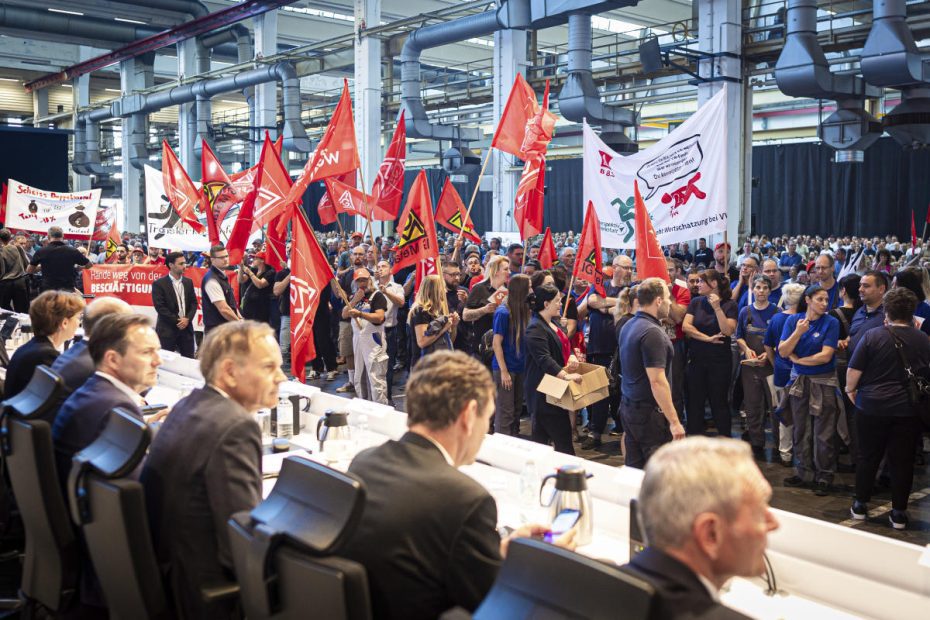FRANKFURT, Germany (AP) — Volkswagen is considering closing some of its home country's factories for the first time in the German automaker's 87-year history, saying otherwise the company would miss the cost-cutting targets it needs to remain competitive.
CEO Oliver Blume also told employees on Wednesday that the company must end a three-decade-old job protection pledge that banned layoffs through 2029.
The statements sparked outrage among employee representatives and concern among German politicians.
Here are some things you should know about the troubles facing one of the world's most famous car brands:
What does Volkswagen propose and why?
Management says the company’s core brand, which bears its name, is expected to achieve €10 billion in cost savings by 2026. It recently emerged that Volkswagen’s Passenger Cars division was not on track to do so, after relying on retirements and voluntary buyouts to reduce its workforce in Germany.
With the European auto market smaller than before the coronavirus pandemic, Volkswagen says it has more factory capacity than it needs, and it is expensive to maintain underutilized assembly lines.
Chief Financial Officer Arno Antlitz explained it this way to the 25,000 employees gathered at the company's home base in Wolfsburg: Europeans are buying around 2 million fewer cars a year than before the pandemic in 2019, when sales were 15.7 million.
With Volkswagen controlling about a quarter of the European market, this means “we have a shortfall of 500,000 cars, the equivalent of about two factories,” Antlitz told workers.
“And that has nothing to do with our products or poor sales performance. The market is simply not there anymore,” he said.
Is Volkswagen making money?
The Volkswagen Group, whose 10 brands include SEAT, Skoda, CUPRA and commercial vehicles, posted an operating profit of 10.1 billion euros ($11.2 billion) in the first half of this year, down 11% from the first half of last year.
Higher costs offset a modest 1.6 percent increase in sales, which reached 158.8 billion euros, but were weighed down by sluggish demand. Blume called it “a solid performance” in a “demanding environment.” Volkswagen's luxury brands, including Porsche, Audi and Lamborghini, are outselling VW's models.
Why is Volkswagen having such a hard time?
The cost-cutting debate is focused on the core brand and its employees in Germany. Volkswagen’s passenger car division posted a 68% drop in profit in the second quarter, with a profit margin of a meager 0.9%, down from 4% in the first quarter.
One reason is that the division took the biggest chunk of the €1 billion it spent on job cuts and other restructuring costs. But rising costs, including higher wages, and slow sales of the company’s electric vehicles are a deeper problem. And new, competitively priced competitors from China are increasing their share of the European market.
Volkswagen needs to sell more electric cars to meet the European Union's increasingly low emissions limits that take effect next year. Still, the company is seeing lower profit margins on those vehicles due to high battery costs and weaker demand for EVs in Europe amid the withdrawal of consumer subsidies and the slow rollout of public charging stations.
Meanwhile, VW's electric vehicles in China are also facing stiff competition from models from local companies.
The world’s automakers are locked in a battle for the future, spending billions to transition to lower-emission electric cars, in a race to develop vehicles that are competitively priced and have enough range to convince buyers to switch. In China, dozens of automakers are making electric cars cheaper than their European equivalents. Increasingly, those cars are being sold in Europe.
Profits also fell at German brands BMW and Mercedes-Benz as a result of the same pressure.
Why are VW's proposed factory and job cuts such a big problem in Germany?
Volkswagen operates 10 assembly and parts plants in Germany, where 120,000 of its 684,000 employees worldwide are based. As Europe's largest automaker, the company is a symbol of the country's consumer prosperity and economic growth after World War II.
It has never closed a German plant before. VW last closed a plant in 1988 in Westmoreland, Pennsylvania; the Audi division is in talks to close an underused plant in Belgium.
Far-right parties, fueled by popular discontent with German Chancellor Olaf Scholz’s bickering three-party coalition government, made big gains in Sept. 1 elections in the states of Thuringia and Saxony, in the former communist East Germany. National polls show the government’s approval ratings at an all-time low. Factory closures are the last thing Scholz’s government needs.
The Chancellor spoke to VW management and employees after the possible factory closures became known. However, he stressed that the decision is a matter for the company and its employees.
Why has Volkswagen not yet implemented the cost savings desired by management?
Employee representatives have a lot of influence at Volkswagen. They hold half of the seats on the board of directors. The state government, which is a co-owner of the company, also holds two board seats — together with the employee representatives, a majority — and 20 percent of the voting rights at the company. Lower Saxony Governor Stephan Weil has said the company must tackle its costs but avoid plant closures.
This means that management will have to negotiate, a process that will take months.
What does the employee side say?
Managers at the employee meeting were subjected to minutes of boos, whistles and honking before they could begin their presentation on the possible explanation. “We are Volkswagen, not you,” the workers chanted.
Daniela Cavallo, chairwoman of the company's works council representing workers, said the council “will not agree to plant closures.” She argued that cutting labor costs will not improve Volkswagen's financial situation.
“Volkswagen's problem is that senior management is not doing its job,” Cavallo said. “There are many other areas that the company is responsible for… We have to have competitive products, we don't have entry-level electric cars.”

